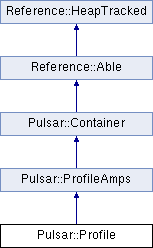 PSRCHIVE
PSRCHIVE
| Ask a Question | Search PSRCHIVE: |
 PSRCHIVE
PSRCHIVE
| Ask a Question | Search PSRCHIVE: |
 Home Home
|
Classes |
Public Types |
Public Member Functions |
Static Public Member Functions |
Static Public Attributes |
Friends |
List of all members
Pulsar::Profile Class Reference Any quantity recorded as a function of pulse phase. More...
Inheritance diagram for Pulsar::Profile:

Detailed DescriptionAny quantity recorded as a function of pulse phase. The Pulsar::Profile class implements a useful, yet minimal, set of functionality required to store, manipulate, and analyse pulsar profiles. Note that:
This arrangement protects the size of each Profile object from becoming unsynchronized with the Integration in which it is contained. The data in each Profile may still be manipulated through public methods. Member Function Documentation◆ add_extension()
Add an Extension to this instance. The derived class must ensure that only one instance of the Extension type is stored. Derived classes need only define this method, as the non-const version implemented by the Profile base class simply calls this method. References extension, and verbose. Referenced by copy(). ◆ average()
set this to the weighted average of this and that A series of additions using this operator preserves the relationship:
where
References extension, Pulsar::Profile::Extension::integrate(), and Profile(). Referenced by Pulsar::Integration::combine(), Pulsar::FrequencyIntegrate::transform(), and Pulsar::TimeIntegrate::transform(). ◆ baseline()
Return a new PhaseWeight instance with the baseline phase bins masked. Return a PhaseWeight mask with the baseline phase bins enabled. References baseline(), Pulsar::Profile::Strategies::baseline(), get_strategy(), Pulsar::ProfileWeightFunction::operate(), and verbose. Referenced by baseline(), Pulsar::FluxPlot::get_flux_error(), Pulsar::AdaptiveSNR::get_snr(), and Pulsar::FortranSNR::get_snr(). ◆ dedisperse()
Rotates the profile to remove dispersion delay. A convenience interface to Profile::rotate_phase. Rotates the profile in order to remove the dispersion delay with respect to a reference frequency.
References centrefreq, rotate_phase(), and verbose. ◆ find_max_phase()
Returns the phase of the centre of the region with maximum mean. Returns the centre phase of the region with maximum mean
References Pulsar::ProfileAmps::get_amps(), Pulsar::ProfileAmps::get_nbin(), mean(), and verbose. Referenced by Pulsar::Statistics::get_peak(). ◆ find_min_phase()
Returns the phase of the centre of the region with minimum mean. Returns the centre phase of the region with minimum mean
References Pulsar::ProfileAmps::get_amps(), Pulsar::ProfileAmps::get_nbin(), mean(), and verbose. Referenced by Pulsar::find_spike_edges(), Pulsar::NoiseStatistics::get_nfnr(), Pulsar::PhaseSNR::get_snr(), and Pulsar::InfoLabel::plot(). ◆ find_transitions()
Find the bin numbers at which the mean power transits. Finds the transitions at which the mean power of a sliding window drops below the mean power (high to low) and at which it jumps back above the mean power (low to high). The function is best-suited to detect the transitions of a pulsed calibrator profile, which is usually a square wave with 0.5 duty cycle. The width of the sliding window is given by Pulsar::Profile::transition_duty_cycle.
References Pulsar::ProfileAmps::get_amps(), Pulsar::ProfileAmps::get_nbin(), stats(), transition_duty_cycle, and verbose. Referenced by Pulsar::ProfilePlot::draw_transitions(), and Pulsar::SquareWave::get_snr(). ◆ get() [1/2]
template<class T>
e.g. Profile* profile; MyExtension* ext = profile->get<MyExtension>(); References verbose. ◆ get() [2/2]
template<class T>
e.g. const Profile* profile; const MyExtension* ext = profile->get<MyExtension>(); References verbose. ◆ get_extension() [1/2]
◆ get_extension() [2/2]
◆ get_weighted_amps()
returns a vector representation of the array of amplitudes, with all zero-weighted points cleaned out References Pulsar::ProfileAmps::get_amps(), Pulsar::ProfileAmps::get_nbin(), and weight. Referenced by Pulsar::LinePhasePlot::draw(). ◆ mean()
Convenience interface to stats, returns only the mean.
References Pulsar::phase(), and stats(). Referenced by correlate_normalized(), find_max_phase(), find_min_phase(), Pulsar::find_spike_edges(), Pulsar::InfoLabel::plot(), stats(), and stats(). ◆ operator=()
◆ resize()
resize the data area Reimplemented from Pulsar::ProfileAmps. References Pulsar::DataExtension::resize(), and Pulsar::ProfileAmps::resize(). Referenced by bscrunch(), copy(), Pulsar::detect(), fold(), Pulsar::fourier_to_re_im(), Pulsar::StokesFluctPlot::get_profiles(), Pulsar::phase(), and Pulsar::MoreProfiles::resize(). ◆ snr()
Returns the signal to noise ratio of the profile. This method calls Profile::snr_strategy References Pulsar::SNRatioEstimator::get_snr(), get_strategy(), Pulsar::Profile::Strategies::snratio(), and verbose. Referenced by Pulsar::SNRWeight::get_weight(). ◆ stats() [1/2]
Calculates the mean, variance, and variance of the mean. Returns the mean, variance, and variance of the mean over the specified interval.
References Pulsar::ProfileAmps::get_amps(), Pulsar::ProfileAmps::get_nbin(), mean(), and verbose. Referenced by correlate_normalized(), Pulsar::ProfilePlot::draw_transitions(), find_transitions(), Pulsar::NoiseStatistics::get_nfnr(), Pulsar::PhaseSNR::get_snr(), Pulsar::SquareWave::get_snr(), mean(), Pulsar::InfoLabel::plot(), Pulsar::Archive::rms_baseline(), and stats(). ◆ stats() [2/2]
Convenience interface to stats (start_bin, end_bin)
References Pulsar::ProfileAmps::get_nbin(), mean(), Pulsar::phase(), stats(), and verbose. Member Data Documentation◆ default_duty_cycle
fractional phase window used in most functions Default fractional pulse phase window used to calculate statistics related to the baseline. Referenced by Pulsar::LawnMower::LawnMower(), Pulsar::NoiseStatistics::NoiseStatistics(), and Pulsar::Smooth::Smooth(). ◆ peak_edges_strategy
The default implementation of the edge detection algorithm. The PeakEdgesInterpreter class sets the peak_edges_strategy attribute according to commands specified either in the configuration file or via the psrsh interpreter. It enables convenient experimentation with the peak edges estimation algorithm. Referenced by find_peak_edges(). ◆ rotate_phase_enabled
Rotation of pulse phase is enabled by default. Rotate the profile by the specified phase. The profile will be rotated such that the power at phase will be found at phase zero. ie.
where Referenced by rotate_phase(). ◆ transition_duty_cycle
fractional phase window used to find rise and fall of running mean Fractional pulse phase window used to calculate the transitions in Pulsar::Profile::find_cal_transition Referenced by find_transitions(). ◆ verbose
flag controls the amount output to stderr by Profile methods When true, Profile methods will output debugging information on cerr Referenced by absolute(), add_extension(), baseline(), bscrunch(), Pulsar::PeakConsecutive::build(), Pulsar::PeakCumulative::build(), Pulsar::PhaseWeight::build(), Pulsar::ProfileStats::build(), Pulsar::Mower::build_mask(), Pulsar::IterativeBaseline::calculate(), Pulsar::OnPulseThreshold::calculate(), dedisperse(), derivative(), Pulsar::ProfileStats::deselect_onpulse(), find_max_bin(), find_max_phase(), find_min_bin(), find_min_phase(), find_transitions(), fold(), get(), get(), Pulsar::GaussianBaseline::get_bounds(), Pulsar::get_Integration(), Pulsar::PolnProfile::get_linear_variance(), Pulsar::NoiseStatistics::get_nfnr(), Pulsar::PhaseGradShift::get_shift(), Pulsar::AdaptiveSNR::get_snr(), Pulsar::FourierSNR::get_snr(), Pulsar::ModularSNR::get_snr(), Pulsar::PhaseSNR::get_snr(), Pulsar::get_Stokes(), Pulsar::get_Stokes(), Pulsar::ProfileStats::get_total(), logarithm(), max(), min(), Pulsar::Integration::new_PolnProfile(), Pulsar::Integration::new_PolnProfile(), Pulsar::RemoveBaseline::Total::operate(), Profile(), Profile(), Pulsar::ColdPlasma< Calculator, History >::range(), rotate_phase(), Pulsar::ProfileStats::select_profile(), Pulsar::ProfileStats::set_baseline_estimator(), Pulsar::ProfileStats::set_exclude_estimator(), Pulsar::ProfileStats::set_include_estimator(), Pulsar::ProfileStats::set_onpulse_estimator(), Pulsar::ProfileStats::set_profile(), Pulsar::ProfileStats::set_regions(), Pulsar::ProfileStats::set_snratio_estimator(), Pulsar::ExponentialBaseline::set_threshold(), Pulsar::GaussianBaseline::set_threshold(), Pulsar::Archive::set_verbosity(), Pulsar::ProfileStats::set_width_estimator(), snr(), square_root(), Pulsar::PhaseWeight::stats(), stats(), stats(), sum(), sumfabs(), sumsq(), Pulsar::TimerProfile_load(), Pulsar::TimerProfile_unload(), Pulsar::Correlate::transform(), Pulsar::ImageCorrection::transform(), Pulsar::Mower::transform(), Pulsar::PolnProfile::transform(), Pulsar::PolnProfile::transform(), Pulsar::ScatteredPowerCorrection::transform(), Pulsar::StokesCovariance::transform(), Pulsar::StokesCovariance::transform(), Pulsar::PolnProfile::~PolnProfile(), and Pulsar::StokesCovariance::~StokesCovariance(). The documentation for this class was generated from the following files:
Generated using doxygen 1.14.0
|
||||||||||||||||||||||||||||||||||||||||||||||||||||||||||||||||||||||||||||||||||||||||||||||||||||||||||||||||||||||||||||||||||||||||||||||||||||||||||||||||||||||||||||||||||||||||||||||||||||||||||||||||||||||||||||||||||||||||||||||||||||||||||||||||||||||||||||||||||||||||||||||||||||||||||||||||||||||||||||||||||||||||||||||||||||||||||||||||||||||||||||||||||||||||||||||||||||||||||||||||||||||||||||||||||||||||||||||||||||||||||||||||||||||||||||||||||||||||||||||||||||||||||||||||||||||||||||||||||||||||||||||||||||||||||||||||||||||||||||||||||||||||||||||||||||||||||||||||||||||||||||||||||||||||||||||||||||||||||||||||||||